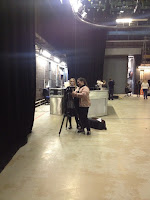The software we are using to write scripts is called 'Final Draft' and in order to learn how to use it in the correct way, we were given a workshop in how to use it. Before we learnt how to use the software itself, we had to learn how to actually write a script in the correct way.
The 6 main points we learnt about when writing a script are:
- Title Page
- Scene Headings
- Action
- Characters
- Dialogue
- Layout
Title Page
In the middle of the page you have to state what the name of the script is, who wrote it and the date it was drafted. The Font must be 'Courier' and it must be size 12. In the bottom left of the page it must state the contact name, the contact address and the contact number.
 Scene Headings
Scene Headings
These must be written in capitals and it must state whether it's inside or outside, where it is located and what time of the day it is. The location must be brief and kept to the point, and the time of the day must be standard and basic (For Example;
DAY or
NIGHT). Every time there is a change of location or time, a new scene must be created. Also when the character walks into a new room, a new scene must be created.
Action
This states where we are, what we are looking at, who is there and what they are doing. When a character appears in the script for the first time, they must be written in CAPITALS. If they are in the script again they can be written normally in lowercase. You also should really avoid camera directions, and just stick to the storyline and what we can see. When you describe dramatic moments, they should be seen in CAPITALS to add some emphasis to them.
Characters
The characters name is always written below the action, one line down the centre of the page, and in CAPITALS. If the scene has a voice-over it should be shown as
(V/O) and it should be placed next to the name. If the character is off screen but still has dialogue it should be shown as
(OS).
Dialogue
This appears below the characters name. If you want emphasis on the way a word is spoken you have to underline it. Also if you want to show how the person is saying the line it should be written in brackets just above the dialogue, for example;
(laughing).
Layout
You shouldn't have huge blocks of text as it makes it un-interesting and busy You can spread the description out on the page to space it out and make the script look less messy and busy.

After learning about the main points of how to write a script and how to use Final Draft, we were given the task to write a three page script about our journey to uni on that day. I worked with Nisserin on this task and we decided to include both of ours journeys into the script. We added a bit more drama in the script to make it more interesting and to create tension. We split between my story and her story and made both of us meet up at the end.
When getting feedback from this script, Simon said he liked it but we needed to make sure that we only included what we could SEE in the action. He also suggested that we added more description on the locations we were using and the characters to give the reader more of a visual image when reading.









